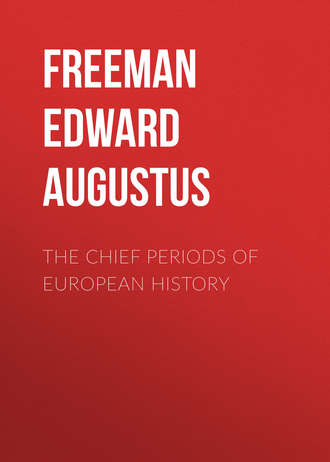
Freeman Edward Augustus
The Chief Periods of European History
LECTURE II.
ROME THE HEAD OF EUROPE
In my last lecture I strove to draw a picture of the Mediterranean lands at the moment when the Greek world, as the Greek world had been shaped by Macedonian conquest, a world of kingdoms, federations, and single cities, a busy and intricate system full of the deepest political lessons at every step, was suddenly startled by the invasion of a power from the West. That power had already slowly risen to the first place in its own Western world; it now sprang as in a moment to the first place in the East; but, having thus sprung to the first place, it was content to fall back on its former slow and piecemeal course. Generations had to pass away before the paramount influence in the Greek world which Rome won at a single grasp was fully changed into immediate dominion over every land and city to which its influence had spread. Very early in the second century B.C. Rome was already the paramount power in the Greek world. She had not a single province east of Hadria; but cities, confederations, kingdoms, all knew that she was practically their mistress. Late in the first century A.D. Rome had many provinces east of Hadria; her immediate dominion had become the rule, and even nominal independence was the exception; but there were still free Greek cities which Vespasian deemed it prudent to bring under his immediate dominion, and there were not a few other free Greek cities which Vespasian left to give Trajan an opportunity of respecting the faith of treaties. The first step in short was sudden and swift; every later step was slow; but the first step carried every later step with it as its necessary consequence. In the interval between the First and Second Punic Wars, Rome appeared east of the Hadriatic as the deliverer of Greek cities from the pirates of Illyricum. That was in truth the first step in that eastward march by which, five hundred and fifty years later, Rome herself, in her own person, followed in the wake of her dominion, and transferred her seat from the seven hills by the Tiber to the seven hills by the Bosporos. Or shall we say that the first step was taken at a far earlier time? The position of Rome as an Italian state, ruling over Greek allies and subjects, but in return deeply affected by Greek influences of every kind, had begun while Rome still dwelled in her own peninsula. Before she crossed the Hadriatic, she had begun to put on the character of that compound power, politically Roman, intellectually Greek, whose calling it was to leaven the world. The extension which was marked, in the later half of the third century, by the Roman alliance with Apollônia, Epidamnos, and Korkyra, was an extension only geographical. The ally or mistress, whichever name we choose, of Naples, Tarentum, and Syracuse, the undoubted mistress of the greater half of Sicily, had already begun to put on the character of a Greek power before she drew sword for or against any city of the elder Greece. Rome had entered the ranks of the Hellênismos before Corinth admitted her citizens to strive in the games of the Isthmos, before Athens honoured them with initiation into the holiest rites of Dêmêtêr and her Child.
In a lecture of my former course I pointed out some of the physical conditions which made it possible for Rome to rise to the headship of the world. The course of all history, I then ventured to say, had been determined by the geological fact that certain hills by the Tiber were lower and nearer together than the other hills of Latium. If I were lecturing on Roman history as such, instead of taking a glance of a moment, a glance of a mere thousand years or so, at Rome in her œcumenical position, I might carry out this thought into great detail. For my present purpose it is enough to say that the central spot of the central peninsula was naturally called to headship. We might point out that the process which made Lugubalium and Nisibis bulwarks of Rome began when the Palatine and the Capitoline hills were girded by a single wall. But it is enough for us to mark the great steps in the advance of the Roman power, the steps which made her the head of Latium, the head of Italy, the head of the West, the head, and in the end the mistress, of the Mediterranean world. In all these stages we must ever bear in mind that the rule of Rome was in the fullest sense the rule of a city, a rule of essentially the same kind as the rule of other ruling cities before and after. It was distinguished from the rule of Athens, Sparta, Carthage, Bern, and Venice only by the vastness of the scale to which the rule of the Roman city extended, and by the process, unparalleled in the history of any other city, by which the franchise of the ruling commonwealth was gradually extended to all its allies and subjects. Latium, Italy, the Mediterranean world, were merged bit by bit, not only in the Roman dominion but in the Roman city, till every Italian ally, every Greek confederate, even every barbarian provincial, had become a citizen of Rome. It is true that the last stage of the process did not take place till to be a citizen of Rome simply meant to be a subject of Rome’s master. It has been doubted, with no small show of reason, whether the edict of Antoninus Caracalla was not an immediate loss rather than an immediate gain to those whom it admitted to the full honours of the Roman name. But the eye of universal history looks at the change in another light. The edict of Antoninus, whatever its immediate motives, whatever its immediate results, did in the end create an artificial Roman nation throughout the Roman dominion, at any rate from the Ocean to Mount Tauros. Every freeman throughout the Empire had now a right in the name and traditions of Rome. We see the results of this change in the men of the fifth and sixth centuries, in those Romans of Gaul and Spain who knew no national name, no national being, save that of the city to which their forefathers had bowed. We see its yet more lasting results in the Romans and the Romania of the East, in the Greek-speaking folk from whom the Roman name has not yet wholly passed away, in the Latin-speaking folk to whom in our own day the Roman name has again become the living badge of their regenerate being.
On Rome then, as head of Europe in a sense in which no other among the powers of Europe ever reached that headship, the two duties of a great European power were laid in a fulness in which they were never laid on any other. Rome was called on, before all others, to be the teacher of nations of her own European stock, to be the champion of Europe against the inroads of barbarians from without. In the former character her teaching had sometimes to be sharp; she had often to wield the rod of as stern a discipline as that with which Gideon taught the men of Succoth. It was the mission of Rome to make the Gaul the partaker of her tongue and culture. It was her mission to make the Teuton the heir of one half of her political power. She was to frame out of his stores and her own a third state of things distinct from either of the elements that went to frame it. Of the union of Teuton and Roman sprang the world of modern Europe. But for that union the nations had to bide their time; as in the games of Hellas, they that rose before the happy moment were scourged back again. They who came as invaders only had to be dealt with as invaders and not as disciples. The Gaul who came before his time had his scourging at Sentinum; the Teuton who came before his time had his scourging at Aquæ Sextiæ and Vercellæ. But how well the work was done with Gauls and Teutons who better knew their time and place, we see when the Gaul Sidonius paints in his Roman speech the portrait of one Theodoric, Gothic lord of a Roman realm; we see it when a greater Theodoric, Gothic lord of a mightier Roman realm, legislates from his throne at Ravenna for the welfare of Rome’s earliest Gaulish province. Here was one side of the mission of the head of Europe, the teacher of the kindred nations. Her other side as European champion, as foremost representative of the Eternal cause, stands forth in her long warfare with the Carthaginian, the Persian, the Arab, and the Turk. And both sides stand forth together when Rome, lady of the nations, marches forth with her Teutonic comitatus round her to meet the hosts of Attila. The work was well in doing when Anianus looked from the walls of Orleans on the banners of deliverance, Roman and Gothic, flocking side by side, in the strife when Roman, Goth, and Frank, Catholic, Aryan, and heathen, joined to deal the final blow for the common European soil on the day of slaughter in the Catalaunian fields.
How the Latin city of Rome marched to the headship of Latium, how the head of Latium marched to the headship of Italy, are matters of Roman rather than of universal history. The œcumenical calling of Rome comes upon her as soon as she has become the head of Italy, perhaps more strictly in the very moment of her becoming such. She is not fully head of Italy till she has beaten back the invader from Epeiros from the shores of her peninsula. But her war with Pyrrhos had brought her into the thick of the Greek world and all its complications. Unless we accept the tales of her earlier dealings with Massalia, Rome has not yet sought either Greek allies or Greek enemies beyond the bounds of Italy. But Greece, in the person of her foremost champion, had come to seek out Rome within those bounds. The fight of Beneventum ruled that Italy should be Italian; it ruled that no Greek power should arise in Western Europe to balance the realms of Ptolemy and Seleukos in the East. It ruled in short that the head of Italy should be Rome. The wars which Rome had waged against the Samnite and the Gaul had made her beyond all comparison the first power in Italy. The war with Pyrrhos, the war that threatened to make Italy, like Asia or Egypt, part of a Greek dominion, made her the undoubted head.
The head of Italy now stood forth as one of the great powers of the world. It marks one of the differences between the political state of those days and that of our own that Rome had no sooner undoubtedly risen to this position than she found herself engaged in a struggle, a struggle well nigh for life and death, with the other great power of the Western Mediterranean. In the modern world, whatever jealousies, controversies, wars, may arise between any of the great powers of Europe, none seeks the utter destruction of any other, none seeks the abiding weakening of any other, its degradation from the rank of a great power. But the establishment of Rome as the undoubted head of Italy, as one of the two greatest powers of the West, at once condemned her to abiding rivalry with the other power, a rivalry which might be salved over by this or that interval of peace, but which meant that, sooner or later, either Rome or Carthage must perish. We must remember that, while between any other two of the great wars of Rome there was some slight interval of peace, the war with Pyrrhos and the Italian allies of Pyrrhos was followed without any break whatever by the first war with Carthage. That war was the War for Sicily. On any theory of natural boundaries, a power that was the head of Italy might reasonably, so far as there is reason in such matters, expect to spread its dominion over the lands within the Alps, and over the three great islands which look like natural appendages to the peninsula of Italy. And a power which spread itself over the lands within the Alps, a power which from its own shores could look out on the mountains of Illyricum, could hardly expect to keep itself wholly unentangled by the affairs of the lands on the other side of Hadria. Rome then had hardly become the head of Italy before two fields of action were opened for her without a breathing-space. She had to strive with the other great power of the West, and signs were not wanting that before long her destiny would call her to mingle in the strifes of Eastern Europe also.
The Western call was the earlier and the nearer. Close on the war with Pyrrhos followed the War for Sicily, the war of more than twenty years waged mainly on the waters by the fleets of Rome and Carthage. As a war for Sicily, as one of the greatest of the many wars for Sicily, it takes its place in the long range of cycles which make up the history of that illustrious island. Rome now for the first time buckled on her harness to play her part in dealing with the Eternal Question. Was the greatest of Mediterranean islands to be a part of Europe or of Africa, to be a possession of Aryan or of Semitic man, to be the home of the gods of Alba and Olympos or of the Moloch and Baalim of the men of Canaan? The Greek had waged the warfare for ages; the fates had gone against him; the realm of Hierôn was but a small survival of the days when Sicily had come so near to being a purely Hellenic island. The calling for which Syracuse was too weak passed on to the stronger hand of Rome. Panormos, won for Europe for eleven hundred years, was no mean first-fruits of the strife. After well nigh a generation of warfare, Rome stood forth victorious, mistress of Sicily, presently mistress of Sardinia and Corsica, seized of her first provincial dominion, rich in the faithful alliance of the first and worthiest of her long line of dependent kings. The rival power came out of the strife, not crushed, hardly weakened, but driven to transfer her energies to a new sphere, to seek in a new land the means of dealing a blow at Rome in the heart of her own Italy.
The choice of that new sphere of Carthaginian energy, the exploits of the house of Hamilkar, the line of the sons of Thunder, of itself opens a new and important, though as yet a secondary, page in the history of Europe. The time has come for the most western of her three peninsulas to play its part in the general affairs of the world. But the peninsula which was not wholly Mediterranean, which had two of its three sides washed by the outer Ocean, was never to play such a part as the elder peninsulas which felt only the waters of the inland sea. A day was to come in ages still far distant when Spain should be a ruling power in Italy and in Greece. But Spain never was to be what Italy or what Greece had been, nor what Italy was to be again. For several centuries her fate was to be a great and flourishing dependency of Rome, which, when it had once fully accepted the dependent relation, was to be less disturbed either by civil wars or by foreign invasion than any other province of the West. And now her fate was a strange one, but a fate which the wonderful cycles of history brought back again after more than nine hundred years. Spain was to be as Sicily. One phase of the Eternal Question was twice to be whether the most western land of Europe should be a part of the Western or the Eastern world. Rome had to win the land from the grasp of the Phœnician; its own sons had in after ages to win it back from the grasp of the Saracen. For the moment the third of the great peninsulas was to be in turn the stronghold of either side, to be the arsenal where Carthage first gathered up her strength for the attempted overthrow of Rome, and where Rome then gathered up her strength for the more than attempted overthrow of Carthage.
The Punic Wars form a kind of episode in the history of Europe, just as the presence of a Punic people in the Western Mediterranean is of itself an anomaly and in some sort an episode. The existence of the Carthaginian power hindered what we might have looked on as the natural course of history for the three great European peninsulas. When Rome had become the undisputed head of Italy, the next growth of her power might have been looked for in the direction of the Gaul and of the Greek. The headship of Italy had been won by driving back a Greek invasion, an invasion from a Greek land within sight of Italy, and that headship might be looked on as imperfect till it was further spread over Sicily at one end and Cisalpine Gaul at the other. Sicily was at once fought for, and in the end won; but it had to be won from the intruding Carthaginian. When the first Punic War was over, the eyes of Rome were again drawn beyond the Po and beyond the Hadriatic. The conquest of Cisalpine Gaul was begun; the Illyrian wars led to the first establishment of Rome as an influence, as a power, in the Eastern peninsula. Protector, mistress in all but name, of Korkyra, Epidamnos, and Apollônia, Rome has become an element in the affairs of Greece herself as well as in those of Greek colonies in Italy, Sicily, Spain, and Gaul. She has won the jealousy of Macedonia, the good will of the free states of Greece. That is, she has taken the first steps towards bringing Greek friends and Greek enemies alike, first under her influence and then under her dominion.
If the first Punic War was in some sort an episode in European history, a check in the expected march of Rome, still more truly can this be said of the second. The Hannibalian War stands out in the history of the world as before all things a strife between a man and a commonwealth, a strife between the first of men and the first of commonwealths. Yet if Hannibal overshadows Carthage, if Carthage seems but an instrument in his hands, we must remember that Hannibal has no being apart from Carthage, that the work that he does is not the work of Hannibal but the work of Carthage. Nor must we let the glory of Hannibal altogether quench the glory of the other members of his house. Rome had to strive against a line of heroes, against the whole lion-brood of the house of Barak. One son of Thunder came after another; what the Grace of Baal began, the Help of Baal came to strengthen. But in our swift œcumenical survey we must be careful of tarrying to do homage even to the greatest of individual men. We have to deal with the results of their actions. The object of the Hannibalian war was the humiliation, the destruction, of Rome. Its effect was to raise Rome higher than ever, to make her in one generation the head of the whole West, before long to be the head of the East also. It brought, as we have seen, the western peninsula into the current of European affairs; it brought it into that current as a stronghold of Roman dominion; it made Rome a power out of Europe; she came out of the struggle more than ever the head of Italy, mistress of all Sicily, advancing to be mistress of Spain, holding a commanding influence in Africa. If she lost Cisalpine Gaul for a season, it was only for a season; the work could be done again, and Rome won an influence in Gaul beyond the Alps which was presently to stand her in good stead. From Eastern Europe her eyes are turned away for a moment, to be turned thither again in another moment with far more steadfastness. That which, but for the check given to the course of things by the great Hannibalian episode, we might have looked for as the next scene of the drama, now actually comes on the stage as an episode within the episode. Under cover as it were of the war with Hannibal, Rome for the first time wages war east of the Hadriatic as the ally of one of the chief Greek powers and as the enemy of another. But if that first war between Rome and Macedonia looks like an episode, if it seems trifling beside the great strife with Hannibal, that was merely because the Macedonian king failed to do what in reason he ought to have done, if he went to war at all. The phalanx and the siege-train of Philip failed to take their place alongside of the horsemen and the elephants of Hannibal. Still the first Macedonian war marks a most important stage in the advance of Rome towards the East. Rome now for the first time measured herself against the resources of a great kingdom, as in the war with Carthage she for the first time measured herself against the resources of a great commonwealth. Rome, Carthage, and Macedonia were now the three great powers of Europe, and Rome had to strive against both the other two at once. It was well indeed for Rome that Macedonia never put forth her full strength while the strength of Carthage was still unbroken. As it was, Hannibal alone, without allies save the barbarians whom he gathered to his standard, after the fearful losses of his Pyrenæan and his Alpine march, was able to win every pitched battle that he fought, and to bring Rome so near to destruction that no power but Rome could have come alive out of the trial.
Never in truth was the Eternal Question so near to its solution, so near to a solution which might have stifled the life of Europe for ever, as when Hannibal debated in his mind whether he should march straight from the field of Cannæ to the gates of Rome. It was a moment like that when it rested on the vote of the polemarch Kallimachos whether the thousands of Athens should meet the tens of thousands of Persia on the day of Marathôn. It is not for us to say whether such a march would have turned the destiny of the world for ever; it is enough that all that formed the life of Europe, all that was to form the life of Christendom, seemed at that moment to hang on the balance. The difficulty is fully to take in that Hannibal and his kinsfolk, the great house and the greatest of its sons, were in truth fighting in the same cause as the mere barbarian destroyers against whom the strife had to be waged at other stages of the long tale. Yet so it is; when we see Rome, with her citizens, colonists, and allies, holding up against the mercenaries of Carthage, when we contrast the votary of Jupiter with the votary of Moloch, we shall soon see on which side it was the abiding interests of mankind truly lay. It was after all in the worthiest of causes that the first of cities was pitted against the first of men. The overthrow of Carthage enabled Rome to go on to the overthrow of Greece; but if Greece was to have a conqueror, it was well that she should have a conqueror who could become a disciple in a way such as the Phœnician never could be. It is hard to name Hannibal along with Attila or even with Abd-al-rahman, yet the day of Zama, or rather the long endurance which made the day of Zama possible, must be set down by the still abiding world of Europe as a great salvation, a crowning mercy, alongside of the work of Aetius and Theodoric and the work of the elder Charles.
How it was that Rome and Europe lived through such a trial, what were the special causes which gave Rome strength to bear up through the most fearful of dangers, it is for special historians of Rome to tell. For us it is enough that Rome came forth out of the struggle mistress of the West, with Carthage spared to live on for rather more than fifty years as a Roman dependency. She was then to perish; her land was to become a Roman province; she was herself, after a hundred years of desolation, to rise again as a Roman city, the head of one of the greatest of Roman lands, the seat of a special and abiding form of Roman life, a life of more than seven hundred years, till the power of Rome in Africa gave way to Semitic invaders more terrible than the old Phœnician. The fight of Zama put an end to the long and wonderful episode of Phœnician power in the Western seas; it left Rome leisure to go on with her work, as conqueror and teacher in Western Europe, as conqueror and disciple beyond Hadria. Whether if Philip had put forth the full power of his kingdom and its allies, he and Hannibal together could have overthrown Rome, it is a waste of time to guess. It is enough for us to know and to rejoice that so it was not; Philip failed to act with Hannibal, and Rome could overthrow Hannibal and Philip, each in his turn. The first Macedonian war brought Rome into the thick of Greek affairs. The Greek states learned all of a sudden what Rome could be either as a friend or as an enemy. But they were slow to learn how truly the relation of either friend or enemy of Rome was only a step to the relation, first of Roman dependent, and then of Roman subject. They were not likely to learn the lesson; neither princes nor commonwealths are ever quick in learning such lessons. The Greeks of that day no more dreamed what Roman interference meant than the Greeks of a hundred and fifty years before had dreamed what Macedonian interference meant. No prince or people ever does in such cases fully understand what is coming. But, seeing Rome had been on the whole the immediate loser in the first Macedonian war, the Greeks of that day were still less likely to see how vastly Rome was a gainer by engaging in any Macedonian war at all. Men who had grown up as leaders in the several Greek states, who were used to look on Greece and the neighbouring powers as forming a world of their own, a world in which Roman interference was as little looked for as interference from another planet, were not likely to foresee the days that were to come before their own lives were ended. Philopoimên dreamed not yet of days when no Greek statesman dared to strike a blow or speak a word without the good will of the barbarian commonwealth which had become practically the mistress of them all. That they did not foresee those days was no special short-sightedness of Greeks or of commonwealths; it was the common short-sightedness of merely human statesmen, who had not, like their critics, the means of profitting by the experience of ages which were still unborn.
At the beginning of the second century B.C. the actual possessions of Rome were small indeed compared with what they were at its ending. When the century opened, Rome was the undoubted head of the West; it was by no means clear that she was ever to become head of the East as well. To rule that so she was to be was the work of that all-important and neglected age. At its beginning, Rome was head of Italy; she was winning back the dominion in Cisalpine Gaul which the Hannibalian war had cost her; but she had no provinces of her own separate winning; she had only the lands in Sicily, Sardinia, and Spain which she had taken over from Carthage, lands which in Spain at least needed frequent hard fighting to enlarge or even to keep. In Transalpine Gaul she had as yet no possessions; Massalia was still an independent and specially cherished ally. In Africa Carthage was an unwilling dependency; Massinissa of Numidia was a faithful and zealous vassal king, to be favoured and strengthened as long as Carthage was allowed to live. In Eastern Europe Rome had indeed begun her dominion beyond Hadria, a dominion as yet over allies and not over acknowledged subjects. But it was a dominion which did not stretch beyond certain points of coast immediately opposite to the Italian peninsula. Rome had appeared as a destroyer in more than one island and city in the heart of Greece; but she had done her work of havoc in fellowship with Greek allies, and, if she had shown herself at all in Greek warfare, it was only because Philip had chosen to be the ally of Hannibal, but not to be his ally in such a sort as to strike at Rome on her own ground. In the further East Pergamon was already the ally of Rome; Attalos and Eumenês were to be as Massinissa so long as either Macedonia or the Seleukid power needed watching on behalf of Rome. The Seleukid power was as yet neither friend nor enemy; Egypt was bound to Rome by a friendship of some standing, but friendship had not as yet brought dependence with it.
Let us look only twenty years later. Rome has not increased her immediate territory on the eastern mainland by a single district or city. But Kephallênia and Zakynthos have joined the company of Korkyra and Epidamnos; Aitôlia has entered the formal relation of Roman dependence; Macedonia has sunk to it as the penalty of warfare with Rome; she has risen again to at least formal independence as the reward of good service to the ruling commonwealth. Beyond her small possessions in Western Greece, Rome has in the Eastern world no dominion but that of influence; but through that dominion she is supreme. The vast dominion of Antiochos, the Great King, successor alike of Cyrus and of Alexander, has been cut short; driven back beyond Tauros, he has almost withdrawn from the Hellenic world; the lord of Asia, seeking for a moment to be lord of Europe, has sunk to be lord only of Syria and of such lands east of Syria as he can keep back from the grasp of the encroaching Parthian. In his stead, royal Pergamon, democratic Rhodes, a crowd of smaller powers, ready to receive the bounty of Rome, have parted out the solid peninsula of Asia among them. The Roman Senate, which so lately sat to devise means by which Rome might be saved from the grasp of Hannibal, now sits as a Court of International Justice for the whole civilized world, ready to hear the causes of every king or commonwealth that has any plaint against any other king or commonwealth, ready even to bend its ear to the voice of every party, of every man, that has any plaint against any other party or any other man within the smallest commonwealth. The Roman Fathers judge the causes of powers which are in theory the equal allies of Rome; they judge by virtue of no law, of no treaty; they judge because the common instinct of mankind sees the one universal judge in the one power which has strength to enforce its judgements. When Rome speaks, all obey; kings fall down at the threshold of the Senate-house, as entering an assembly of gods; they keep themselves humbly within the line that the Roman rod traces round them, even on soil that they have made their own. Rome in truth rules from the Hadriatic to the Euphrates no less than from the Ocean to the Hadriatic; but save in the old Roman land which is her own, save in the few provinces which she has taken over as part of the spoil of Carthage, her power is still everywhere a power of influence and nowhere of direct dominion.
The work of the hundred and fifty years which were to pass before Rome came to obey the rule of a single man was largely to change this power of influence into a power of direct dominion, in a word to change allied and dependent states into subject provinces. Let us look again in the later years of that same second century. Italy has extended herself, if not in formal language, if not in legal right, yet in the common speech of men, over all the lands within the Alps. Gaul is now the land beyond the Alps where Rome, now protector of Massalia, has won a mighty province, a province binding together Italy and Spain, and keeping her old ally as it were in ward. Spain has largely become a Roman land; it has altogether become a Roman possession, save only those mountain districts which so many conquerors, each in turn, have found it so hard to conquer. Africa is a province; Carthage is a wilderness; Numidia and Mauretania are helpless dependencies. East of the Hadriatic, not a few lands and cities, Athens, Sparta, Rhodes, Byzantium, the wise confederates of Lykia, still keep their formal independence. But direct dominion has widely advanced; if not as yet actually the rule, yet it is the fate which has overwhelmed the greatest powers; the kingdom of Macedonia is now the province of Macedonia; the kingdom of Pergamon, so lately enlarged out of Seleukid spoils, is now the province of Asia; Achaia, with Corinth lying waste, is, whether formally a province or not, at least so utterly dependent as to make the question as to its political state a question merely formal. Syria, Egypt, all the kingdoms of Asia, must count as vassals of Rome. If absolute freedom lives on anywhere in the Mediterranean world, it is where freedom is the shame of Rome rather than her glory; the independence which Rhodes and Athens keep but in name is kept in all its fulness by the pirates of Crete and the pirates of Kilikia.







